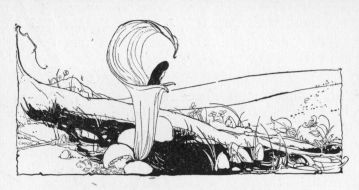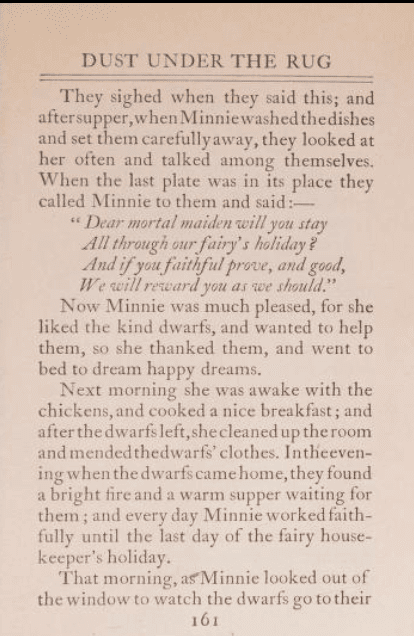Top o' the Morning to you! . . . or whenever you may read this story celebrating St. Patrick's Day.
The 1844 edition of Thomas Crofton Croker's The Fairy Legends and Traditions of the South of Ireland holds many delightful tales of the various unusual "people" found in the Emerald Isle. Many people visiting there go to Killarney National Park near Killarney, County Kerry. Who knows? You may be visited by the spirit of O’Donoghue. Hopefully you won't be as desperate as Bill Doody when he met the O’Donoghue.
 |
| Killarney National Park |
RENT-DAY.
“Oh ullagone, ullagone! this is a wide world, but what will we do in
it, or where will we go?” muttered Bill Doody, as he sat on a rock by
the Lake of Killarney. “What will we do? to-morrow’s rent-day, and Tim
the Driver swears if we don’t pay up our rent, he’ll cant every
ha’perth we have; and then, sure enough, there’s Judy and myself,
and the poor little grawls,[33] will be turned out to starve on the
high road, for the never a halfpenny of rent have I!—Oh hone, that
ever I should live to see this day!”
Thus did Bill Doody bemoan his hard fate, pouring his sorrows to the
reckless waves of the most beautiful of lakes, which seemed to mock
his misery as they rejoiced beneath the cloudless sky of a May
morning. That lake, glittering in sunshine, sprinkled with fairy isles
of rock and verdure, and bounded by giant hills of ever-varying hues,
might, with its magic beauty, charm all sadness but despair; for alas,
“How ill the scene that offers rest,
And heart that cannot rest, agree!”
Yet Bill Doody was not so desolate as he supposed; there was one
listening to him he little thought of, and help was at hand from a
quarter he could not have expected.
“What’s the matter with you, my poor man?” said a tall portly-looking
gentleman, at the same time stepping out of a furze-brake. Now Bill
was seated on a rock that commanded the view of a large field. Nothing
in the field could be concealed from him, except this furze-brake,
which grew in a hollow near the margin of the lake. He was, therefore,
not a little surprised at the gentleman’s sudden appearance, and
began to question whether the personage before him belonged to this
world or not. He, however, soon mustered courage sufficient to tell
him how his crops had failed, how some bad member had charmed away his
butter, and how Tim the Driver threatened to turn him out of the farm
if he didn’t pay up every penny of the rent by twelve o’clock next
day.
“A sad story indeed,” said the stranger; “but surely, if you
represented the case to your landlord’s agent, he won’t have the heart
to turn you out.”
“Heart, your honour! where would an agent get a heart!” exclaimed
Bill. “I see your honour does not know him: besides, he has an eye on
the farm this long time for a fosterer of his own; so I expect no
mercy at all at all, only to be turned out.”
“Take this, my poor fellow, take this,” said the stranger, pouring a
purse-full of gold into Bill’s old hat, which in his grief he had
flung on the ground. “Pay the fellow your rent, but I’ll take care it
shall do him no good. I remember the time when things went otherwise
in this country, when I would have hung up such a fellow in the
twinkling of an eye!”
These words were lost upon Bill, who was insensible to every thing but
the sight of the gold, and before he could unfix his gaze, and lift up
his head to pour out his hundred thousand blessings, the stranger was
gone. The bewildered peasant looked around in search of his
benefactor, and at last he thought he saw him riding on a white horse
a long way off on the lake.
“O’Donoghue, O’Donoghue!” shouted Bill; “the good, the blessed
O’Donoghue!” and he ran capering like a madman to show Judy the gold,
and to rejoice her heart with the prospect of wealth and happiness.
The next day Bill proceeded to the agent’s; not sneakingly, with his
hat in his hand, his eyes fixed on the ground, and his knees bending
under him; but bold and upright, like a man conscious of his
independence.
“Why don’t you take off your hat, fellow; don’t you know you are
speaking to a magistrate?” said the agent.
“I know I’m not speaking to the king, sir,” said Bill; “and I never
takes off my hat but to them I can respect and love. The Eye that sees
all knows I’ve no right either to respect or love an agent!”
“You scoundrel!” retorted the man in office, biting his lips with rage
at such an unusual and unexpected opposition, “I’ll teach you how to
be insolent again—I have the power, remember.”
“To the cost of the country, I know you have,” said Bill, who still
remained with his head as firmly covered as if he was the lord
Kingsale himself.
“But come,” said the magistrate; “have you got the money for me?—this
is rent-day. If there’s one penny of it wanting, or the running gale
that’s due, prepare to turn out before night, for you shall not remain
another hour in possession.”
“There is your rent,” said Bill, with an unmoved expression of tone
and countenance; “you’d better count it, and give me a receipt in full
for the running gale and all.”
The agent gave a look of amazement at the gold; for it was gold—real
guineas! and not bits of dirty ragged small notes, that are only fit
to light one’s pipe with. However willing the agent may have been to
ruin, as he thought, the unfortunate tenant, he took up the gold, and
handed the receipt to Bill, who strutted off with it as proud as a cat
of her whiskers.
The agent going to his desk shortly after, was confounded at beholding
a heap of gingerbread cakes instead of the money he had deposited
there. He raved and swore, but all to no purpose; the gold had become
gingerbread cakes, just marked like the guineas, with the king’s head,
and Bill had the receipt in his pocket; so he saw there was no use in
saying any thing about the affair, as he would only get laughed at for
his pains.
From that hour Bill Doody grew rich; all his undertakings prospered;
and he often blesses the day that he met with O’Donoghue, the great
prince that lives down under the lake of Killarney.
Like the butterfly, the spirit of O’Donoghue closely hovers over the
perfume of the hills and flowers it loves; while, as the reflection of
a star in the waters of a pure lake, to those who look not above,
that glorious spirit is believed to dwell beneath.
[33] Children.
 |
| Found this sweet photo on an email from author Victoria L.K. Williams. As a readership test, let me know if you see it. |
****************
This is part of a
series of postings of stories under the category, “Keeping the
Public in Public Domain.” The idea behind Public Domain was to
preserve our cultural heritage after the authors and their immediate
heirs were compensated. I feel strongly current copyright law delays
this intent on works of the 20th century. My own library
of folklore includes so many books within the Public Domain I decided
to share stories from them. I hope you enjoy discovering them.
At
the same time, my own involvement in storytelling regularly creates
projects requiring research as part of my sharing stories with an
audience. Whenever that research needs to be shown here, the
publishing of Public Domain stories will not occur that week.
This is a return to my regular posting of a research project here.
(Don't worry, this isn't dry research, my research is always geared
towards future storytelling to an audience.) Response has
convinced me that "Keeping the Public in Public Domain"
should continue along with my other postings as often as I can manage
it.
See the sidebar for other Public
Domain story resources I recommend on the page “Public Domain Story Resources."


.jpg)










